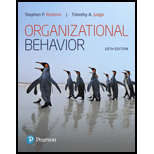
To determine:
The three components of attitudes
Introduction:
An Attitude is a learnt tendency to evaluate things in a certain way. These things includes but not limited to people, places, products etc. Attitudes are formed based on three components, namely Affective component, Behavioral component and Cognitive component. This is also known as the ABC of attitude. These three components in combination will create an individual’s attitude towards a certain person or an object.
Explanation of Solution
Affective component refers to the emotional aspect of the attitude. It is about those emotions that are attached with the object. Emotions are mental activities based on conscious experiences and include things such as fear, happiness, anger etc. The affective component will shape our attitude towards a certain thing. E.g.-: “I am afraid of spiders”, fear is an affective component and this emotion will force the individual to have a displeasing attitude towards spiders.
Behavioral component refers to those actions and behaviors, one would demonstrate as a result of the attitude formed. These can be physical behaviors such as running, shouting or screaming when spiders are seen or non physical behaviors such as avoiding spiders.
The cognitive component refers to the mental process of acquiring knowledge and information about a certain object that will shape our attitude. This may be influenced by our learning, beliefs, and experiences. For e.g.-: I have seen how painful spider bites can be on TV therefore; i know that they are dangerous.
Individuals form attitudes for everything around them; it helps us to create our perception about the surrounding. An attitude is formed based on an individual’s knowledge about the object (cognitive), combined with their emotional reactions (affective) and their actions toward that object (behavioral).
Want to see more full solutions like this?
Chapter 3 Solutions
Organizational Behavior (18th Edition) (What's New in Management)
 Understanding BusinessManagementISBN:9781259929434Author:William NickelsPublisher:McGraw-Hill Education
Understanding BusinessManagementISBN:9781259929434Author:William NickelsPublisher:McGraw-Hill Education Management (14th Edition)ManagementISBN:9780134527604Author:Stephen P. Robbins, Mary A. CoulterPublisher:PEARSON
Management (14th Edition)ManagementISBN:9780134527604Author:Stephen P. Robbins, Mary A. CoulterPublisher:PEARSON Spreadsheet Modeling & Decision Analysis: A Pract...ManagementISBN:9781305947412Author:Cliff RagsdalePublisher:Cengage Learning
Spreadsheet Modeling & Decision Analysis: A Pract...ManagementISBN:9781305947412Author:Cliff RagsdalePublisher:Cengage Learning Management Information Systems: Managing The Digi...ManagementISBN:9780135191798Author:Kenneth C. Laudon, Jane P. LaudonPublisher:PEARSON
Management Information Systems: Managing The Digi...ManagementISBN:9780135191798Author:Kenneth C. Laudon, Jane P. LaudonPublisher:PEARSON Business Essentials (12th Edition) (What's New in...ManagementISBN:9780134728391Author:Ronald J. Ebert, Ricky W. GriffinPublisher:PEARSON
Business Essentials (12th Edition) (What's New in...ManagementISBN:9780134728391Author:Ronald J. Ebert, Ricky W. GriffinPublisher:PEARSON Fundamentals of Management (10th Edition)ManagementISBN:9780134237473Author:Stephen P. Robbins, Mary A. Coulter, David A. De CenzoPublisher:PEARSON
Fundamentals of Management (10th Edition)ManagementISBN:9780134237473Author:Stephen P. Robbins, Mary A. Coulter, David A. De CenzoPublisher:PEARSON





